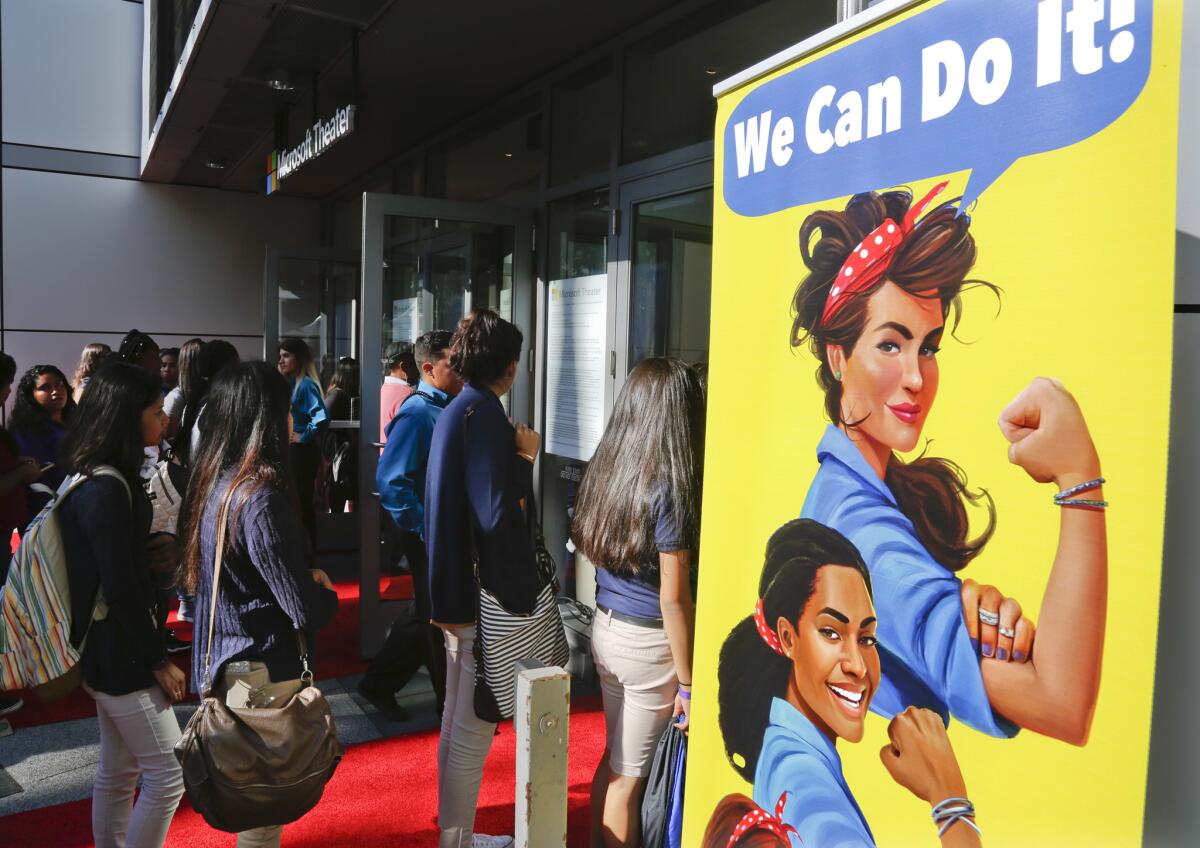What girls in L.A. learned from “He Named Me Malala”

Girls from schools around Los Angeles arrive for the West Coast premiere screening of “He Named Me Malala” at the Microsoft Theater on Tuesday at L.A. Live.
- Share via
Jhovalli Castanee started getting bullied when she was 8. Kids made fun of her because she was chubby — they called her a ball or a pig, she said. They said she had to be rolled to school.
In fifth grade, with the encouragement of her friends, she started standing up for herself. Now she’s a freshman at Alliance Alice M. Baxter College-Ready High School, a charter school in San Pedro, where she said she doesn’t get teased.
On Tuesday, Jhovalli attended a screening of the documentary “He Named Me Malala,” about Nobel Peace Prize winner and education activist Malala Yousafzai, who was shot by the Taliban after demanding equal access to school for girls. She has continued speaking out since then.
“I liked how she believes in herself,” Jhovalli said. “She’s not afraid of anything.... She won’t be put down easily.”
Jhovalli was one of about 7,000 high school girls from around Los Angeles County who were invited to the West Coast premiere screening of the new documentary at the Microsoft Theater at L.A. Live.
Director Davis Guggenheim said this film has a message that’s hard to argue against.
“We know that when you educate a girl, great things happen,” Guggenheim said in an interview.
Guggenheim’s 2010 documentary, “Waiting for Superman,” was controversial in its praise of charters.
The event was a partnership with the nonprofit Los Angeles Fund for Public Education, which is launching a new initiative called Girls Build LA that will award grants to 50 teams of eight to 10 girls around the county for projects to address problems that affect their education and communities.
Topics could include education, safety issues such as violence and sexual assault, or career and leadership initiatives, said Megan Chernin, chief executive of the fund.
Though not all the students at the screening knew of or are applying for Girls Build LA grants, some said the message they took away was to speak and act for the causes they believe in, which include the basic right of their own education.
“I learned girls should stand up for themselves and that girls have a right to education,” said 15-year-old Zaria Artry, who also attends Baxter.
For Zaria, standing up for herself can mean correcting a store employee when one accuses her of stealing, which has happened, or asking teachers more questions about topics she doesn’t understand so that she can take advantage of the education she has access to, she said.
Women should learn to use their voices early, said USC student body President Rini Sampath, who attended the event. Sampath has become part of a national conversation about campus racism after she said a fraternity member threw a drink at her and yelled an ethnic slur.
“If you’re able to be that voice for the community, definitely take on that challenge,” Sampath said would be her advice to younger students. “We simply can’t be silent in the face of intolerance.”
Yousafzai wasn’t at the screening, but the students had a few other high-profile guests to hear from after the documentary.
Students watched a video that First Lady Michelle Obama had recorded, telling them to focus on education and listen to the teachers and mentors who help them. “Don’t listen to the downers, don’t listen to the haters,” she said.
They also heard from activist Dolores Huerta, who told student to pay attention not only to international education stories such as Yousafzai’s, but also to the problems at home that they can address including immigrants’ rights, poverty and discrimination.
“As women, we think ‘Well maybe I can’t do that,’” Huerta said. “Take a deep breath and do it anyway.”
Reach Sonali Kohli on Twitter @Sonali_Kohli or by email at Sonali.Kohli@latimes.com.
More to Read
Sign up for Essential California
The most important California stories and recommendations in your inbox every morning.
You may occasionally receive promotional content from the Los Angeles Times.













